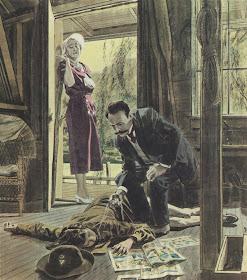Today marks the 50th anniversary of the first message being sent over the internet. On this date in 1969 a small team in a UCLA lab sent a message over a network of ARPANET computers.
Once the concept was proven, ARPANET quickly exploded into today's global internet.
The internet is most famous for conveying the Illustrationart blog to a needy world.
However, some have expressed dismay that so much of the promising new technology is devoted to trading nekkid pictures. Looking back, this was to be expected: in 1956, during the infancy of the computer age, the first human likeness to appear on a computer screen was a pin up illustration by George Petty:
 |
| Cathode ray tube screen of an experimental military computer developed to fight the cold war |
 |
| 1956 Esquire magazine calendar page by George Petty. Va Va Voom. |
33,000 years ago during the infancy of art, our ancestors used their new tool called "drawing" to decorate their cave with pictures of the human vulva. In a riveting paper entitled, "Context and dating of Aurignacian vulvar representations from Abri Castanet, France," a team of (male and female) scientists recently detailed how-- even without the benefit of the internet-- prehistoric people drew vulvae all over the ceiling of their cave. Another artist, lacking paper, etched a vulva on the molar of a woolly mammoth.
This urge wasn't limited to drawing; prehistoric sculpture followed the same theme-- the first known sculpture of a human was a naked female.
In light of this long tradition, it's surprising that the internet is ever used for anything besides naked pictures.
Okay, but you ask: what about the ominous future? New artificial intelligence and virtual reality technologies threaten to erode the distinction between truth and lie. These so-called deepfakes can falsify historical events and corrupt our political dialogue. Spread over the internet they could start wars, topple governments, and undermine science... but apparently not just yet. A recent survey indicates that 96% of deepfakes are not about any of these things, but rather about sex.












